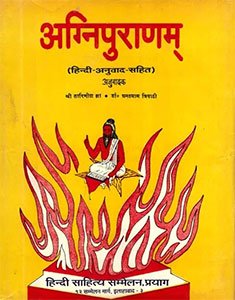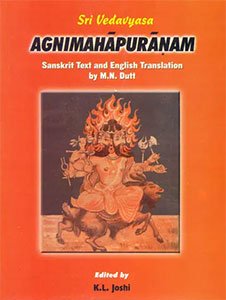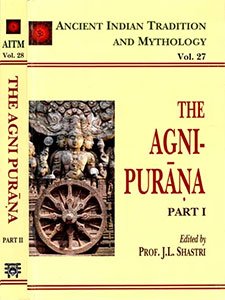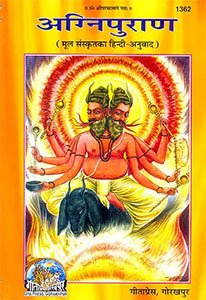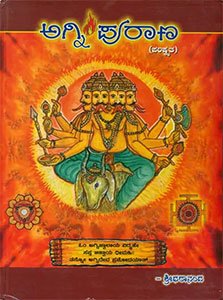Agni Purana [sanskrit]
97,288 words
This Sanskrit edition of the Agnipurana. It is one of the traditional eighteen Mahapuranas presented as an encyclopedia of ancient Indian history and knowledge. It contains either 382 or 383 chapters and over 10.000 verses (Sanskrit Shlokas).
Verse 50.19
शरचापौ दक्षिणेऽस्यावामे चक्रं धनुर्वृषे ।
कौमारी शिखिगा रक्ता शक्तिहस्ता द्विबाहुका ॥ १९ ॥
śaracāpau dakṣiṇe'syāvāme cakraṃ dhanurvṛṣe |
kaumārī śikhigā raktā śaktihastā dvibāhukā || 19 ||
The Sanskrit text of Verse 50.19 is contained in the book The Agni Puranam (Anandashram Edition) by Shri Chimna Apate (श्री चिमणा आपटे). This book is available online or you could buy the latest edition:
Read online Buy now! The Sanskrit text by Shri Chimna Apate (श्री चिमणा आपटे) (1987)
Glossary of Sanskrit terms
Note: This extracts Sanskrit terms and links to English definitions from the glossary, based on an experimental segmentation of verse (50.19). Some terms could be superfluous while some might not be mentioned. Click on the word to show English definitions.
Sharacapa, Dakshine, Dakshina, Asi, Ama, Cakra, Dhanu, Dhanus, Vrisha, Vrishi, Kaumari, Shikhi, Shikhin, Raktri, Rakta, Shaktihasta, Dvibahu,
Analysis of Sanskrit grammar
Note: this is an experimental feature and only shows the first possible analysis of the Sanskrit text (Verse 50.19). If the system was successful in segmenting the sentence, you will see of which words it is made up of, generally consisting of Nouns, Pronouns, Verbs, Participles and Indeclinables. Click on the link to show all possible derivations of the word.
- Line 1: “śaracāpau dakṣiṇe'syāvāme cakraṃ dhanurvṛṣe ”
- śaracāpau -
-
śaracāpa (noun, masculine)[nominative dual], [vocative dual], [accusative dual]
- dakṣiṇe' -
-
dakṣiṇe (indeclinable)[indeclinable]dakṣiṇa (noun, masculine)[nominative plural], [locative single]dakṣiṇa (noun, neuter)[nominative dual], [vocative dual], [accusative dual], [locative single]dakṣiṇā (noun, feminine)[nominative dual], [vocative single], [vocative dual], [accusative dual]
- asyāvā -
-
asī (noun, feminine)[nominative dual], [vocative dual], [accusative dual]√as (verb class 4)[imperative active first dual]√sā (verb class 4)[imperfect active first dual]
- āme -
-
āma (noun, masculine)[locative single]āma (noun, neuter)[nominative dual], [vocative dual], [accusative dual], [locative single]āmā (noun, feminine)[nominative dual], [vocative single], [vocative dual], [accusative dual]
- cakram -
-
cakra (noun, masculine)[adverb], [accusative single]cakra (noun, neuter)[adverb], [nominative single], [accusative single]cakrā (noun, feminine)[adverb]
- dhanur -
-
dhanus (noun, neuter)[compound], [adverb], [nominative single], [vocative single], [accusative single]dhanu (noun, feminine)[nominative single]dhanu (noun, masculine)[nominative single]
- vṛṣe -
-
vṛṣa (noun, masculine)[locative single]vṛṣa (noun, neuter)[nominative dual], [vocative dual], [accusative dual], [locative single]vṛṣā (noun, feminine)[nominative dual], [vocative single], [vocative dual], [accusative dual]vṛṣi (noun, masculine)[vocative single]vṛṣi (noun, feminine)[vocative single]
- Line 2: “kaumārī śikhigā raktā śaktihastā dvibāhukā ”
- kaumārī -
-
kaumārī (noun, feminine)[compound], [nominative single]
- śikhi -
-
śikhi (noun, masculine)[compound], [adverb]śikhī (noun, feminine)[adverb], [vocative single]śikhin (noun, masculine)[compound], [adverb]śikhin (noun, neuter)[compound], [adverb], [nominative single], [vocative single], [accusative single]
- gā* -
-
ga (noun, masculine)[nominative plural], [vocative plural]gā (noun, feminine)[nominative plural], [vocative plural], [accusative plural]go (noun, masculine)[accusative plural]√gā (verb class 2)[injunctive active second single]√gā (verb class 3)[injunctive active second single]
- raktā -
-
raktṛ (noun, masculine)[nominative single]raktā (noun, feminine)[nominative single]√rag -> raktā (participle, feminine)[nominative single from √rag class 1 verb]√raj -> raktā (participle, feminine)[nominative single from √raj class 1 verb], [nominative single from √raj class 4 verb]√rañj -> raktā (participle, feminine)[nominative single from √rañj class 1 verb], [nominative single from √rañj class 4 verb]
- śaktihastā* -
-
śaktihasta (noun, masculine)[nominative plural], [vocative plural]
- dvibāhu -
-
dvibāhu (noun, masculine)[compound], [adverb]dvibāhu (noun, neuter)[compound], [adverb], [nominative single], [vocative single], [accusative single]dvibāhu (noun, feminine)[compound], [adverb]
- kā -
-
kā (indeclinable interrogative)[indeclinable interrogative]kā (pronoun, feminine)[nominative single]
Other editions:
Also see the following editions of the Sanskrit text or (alternative) English translations of the Verse 50.19
Agni Purana with Hindi Translation
by Tarinish Jha and Dr. Ghanshayam Tripathi (तारिणीश् झा और डॉ. घनश्याम त्रिपाठी) (2007)
Publisher: Hindi Sahitya Sammelan, Allahabad; 1199 pages; Title: अग्निपुराणम् (संस्कृत एवं हिन्दी अनुवाद);
Buy now!
Agni Purana (Two Volumes)
by M. N. Dutt (2023)
Publisher: Parimal Publication Pvt. Ltd.; Editor: K. L. Joshi.; ISBN-10: 8171101690; ISBN-13: 9788171101696; 1070 pages.
Buy now!
Agni-Purana (Set of 4 Volumes)
by N. Gangadharan (2006)
Publisher: Motilal Banarsidass Publishers Pvt. Ltd.; ISBN: Part I 8120803590 (9788120803596); Part II 8120803604 (9788120803602); Part III 8120801741 (9788120801745); Part IV 812080306X (9788120803060); 1271 pages.
Buy now!
The Agni Purana (Hindi)
by (2013)
Publisher: Gita Press, Gorakhpur; Title: अग्निपुराण (केवल हिन्दी अनुवाद); ISBN-10: 8129302934; ISBN-13: 9788129302939; 848 pages.
Buy now!
Agni Purana (Kannada)
by Sreedharananda (2013)
Publisher: Pooja Pusthaka Bhandara, Bangalore; Title: ಅಗ್ನಿ ಪುರಾಣ; 560 pages.
Buy now!Preview of verse 50.19 in Kannada sript:
ಶರಚಾಪೌ ದಕ್ಷಿಣೇಽಸ್ಯಾವಾಮೇ ಚಕ್ರಂ ಧನುರ್ವೃಷೇ ।
ಕೌಮಾರೀ ಶಿಖಿಗಾ ರಕ್ತಾ ಶಕ್ತಿಹಸ್ತಾ ದ್ವಿಬಾಹುಕಾ ॥ ೧೯ ॥
![Agni Purana [sanskrit] - book cover](/uploads/a/Agni-Purana-Sanskrit.jpg)
